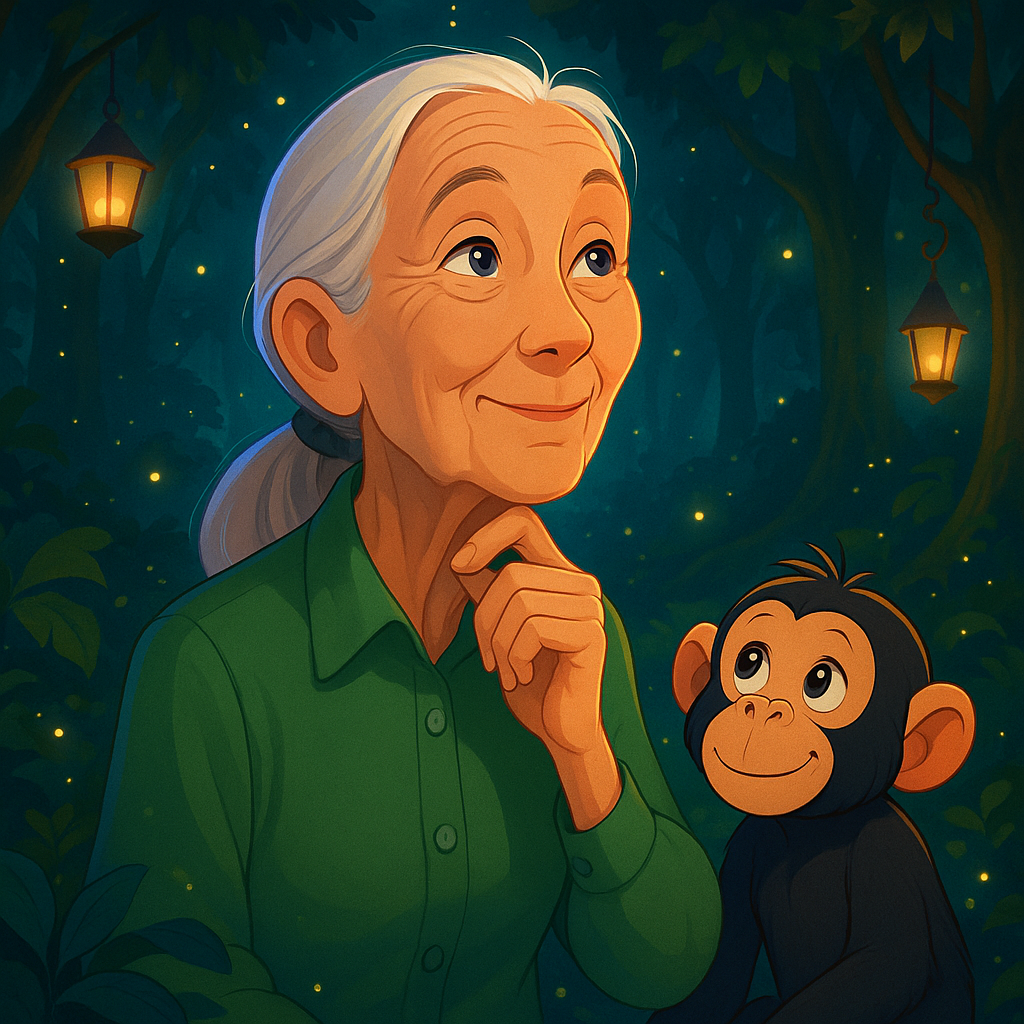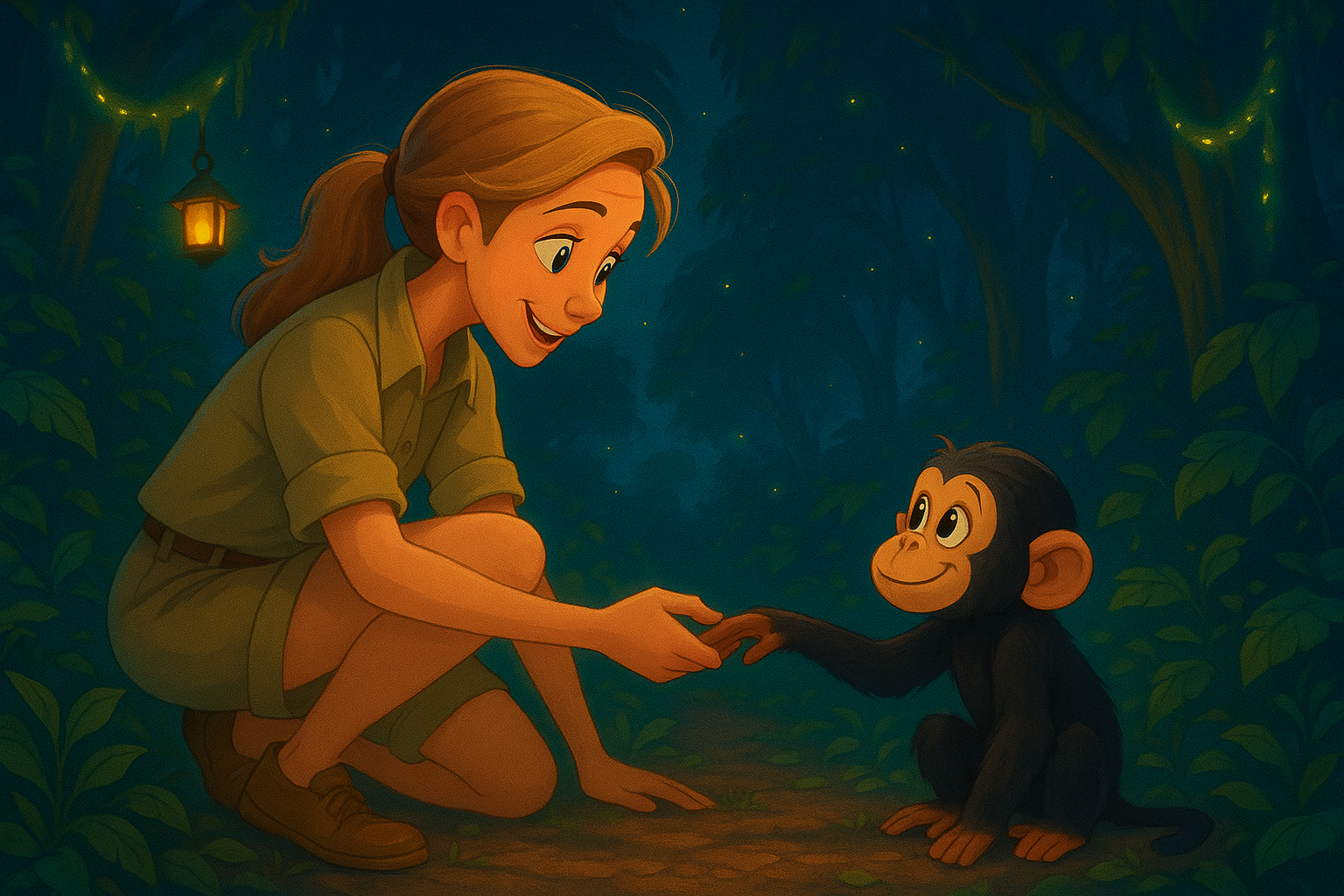On an April morning in 1934, in London, a baby girl was born who would grow up with a stuffed toy chimpanzee in her crib. Her father gave it to her after seeing a movie called King Kong.
Most parents would have worried the gift might frighten a child. But for Jane, “Jubilee” — the toy chimp — became her companion. Years later, she would say:
“My passion for animals began when I was very little.”
That passion, quiet and relentless, would lead her from the streets of England to the heart of an African forest, and to a life spent re-defining how humanity sees itself.
The Girl Who Watched
As a child, Jane loved to disappear into the garden. Once, when she was five, she vanished for hours. Her mother was frantic, ready to call the police — until Jane appeared, eyes shining, with a story: she had been hiding in a henhouse, waiting to see how a hen lays an egg.
Her mother, instead of scolding her, listened. “That patience,” Jane later said, “was the foundation of everything I became.”
Africa, A Dream Without a Map
Jane never went to university at first; her family couldn’t afford it. She worked as a secretary, as a waitress — saving every shilling for a dream she couldn’t explain. She read Tarzan of the Apes and told herself:
“One day, I will live with animals in Africa.”
In 1957, a letter from a school friend invited her to Kenya. Jane was 23, with nothing but notebooks and a heart full of wonder. She boarded a ship and sailed across continents.
Meeting a Mentor
In Nairobi, fate introduced her to Dr. Louis Leakey, the famous paleontologist. He was looking for someone untrained in rigid scientific habits, someone who could observe with fresh eyes. Jane, without a degree but with boundless curiosity, was his answer.
Leakey sent her to Gombe Stream, Tanzania, in 1960, with a pair of binoculars, a notebook, and the simple instruction: watch.
“What you discover could change everything we know.”
The First Glimpse
For months, the chimpanzees fled at the sight of her. She climbed hills, hid in foliage, sat for hours as the tropical sun burned. Then one day, a male she named David Greybeard did not run. He looked at her, calmly, and allowed her to watch as he stripped a twig of leaves and used it to fish termites from a mound.
The world’s textbooks had to be rewritten. Until that moment, “tool use” was believed to be the dividing line between humans and animals. Leakey, upon hearing Jane’s discovery, famously said:
“We must now redefine ‘tool,’ redefine ‘man,’ or accept chimpanzees as human.”
A Voice for the Voiceless
From that day, Jane’s life belonged to the forest. She gave the chimps names instead of numbers — David Greybeard, Flo, Flint, Fifi. Critics mocked her for “unscientific sentimentality.” But she insisted:
“You cannot share your life with a dog or a cat and not know perfectly well that animals have personalities and minds and feelings.”
Her work was not just science; it was empathy turned into evidence.
Beyond the Forest
In the decades that followed, Jane Goodall became a voice that carried from Gombe’s quiet streams to the halls of the United Nations.
She founded the Jane Goodall Institute and launched Roots & Shoots, empowering young people worldwide to act for animals and the environment.
Her message remained simple yet urgent:
“What you do makes a difference, and you have to decide what kind of difference you want to make.”
The Woman Who Still Hopes
Jane Goodall’s life has been one of courage, empathy, and relentless hope. Now in her nineties, she continues to travel and inspire, her soft voice carrying the weight of truth:
“Every individual matters. Every individual has a role to play. Every individual makes a difference.”
From the girl in the henhouse to the woman in the forest, Jane Goodall has shown that sometimes the greatest revolutions begin not with noise, but with listening.
Jane Goodall teaches us that real change begins with curiosity, compassion, and the courage to act. Her life is a reminder that to save the planet, we must first remember that we are not apart from nature—we are part of it.

“Only if we understand can we care. Only if we care will we help. Only if we help shall they be saved.”
“We are part of the animal kingdom, not separated from it.”
“Change happens by listening and then starting a dialogue with the people who are doing something you don’t believe is right.”
“I like to envision the whole world as a jigsaw puzzle… If you look too closely at the pieces, it looks like a mess. But when you step back, you see the whole picture.”
